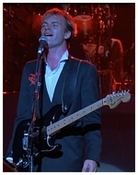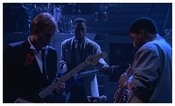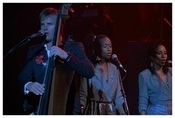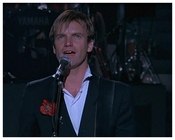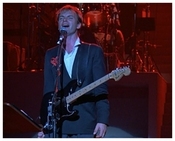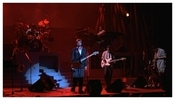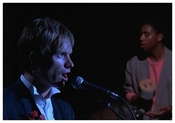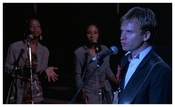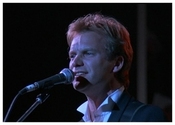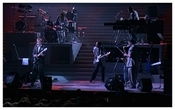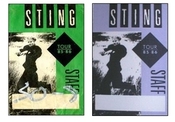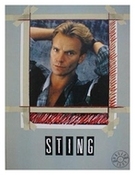
Blue Turtles
Aug
13
1985
San Diego, CA, US
State University Amphitheater
Sting's solo tour crosses bridge from hot pop to cool jazz...
Whether by coincidence or foresight, Sting opened his solo USA tour Tuesday in an academic setting, the outdoor amphitheater at the state university here. It was an appropriate site: The searing two hours drew heavily from the composer/singer/bass player's new LP, 'The Dream of the Blue Turtles'. It proved to be Professor Sting's seminar in mixing progressive music-making with message rock, presented with a keen sense of showmanship. If this is education, let's all go back to school.
The Police star seemed eager to ward off any uneasiness among his rock fans toward the jazz he's exploring. Backed by the musicians with whom he recorded Dream (Branford Marsalis, saxophone; Omar Hakim, drums; Kenny Kirkland, keyboards; Darryl Jones, bass), he stuck close to melodic lines rather than long, improvisational jams. Using his superstar charisma as leverage, Sting turned this performance into a high energy consciousness-raising session.
Typical of his crossover strategy was the familiar 'One World' (from 'Ghost in the Machine') as a reggae segue into the new 'Love Is The Seventh Wave'. Before launching into a challenging 'Fortress Around Your Heart', he did a highly theatrical rendition of 'Moon Over Bourbon Street', a spooky song about a vampire. From their opening shout of recognition at the first lines of 'Shadows in the Rain', the fans seemed comfortable with the new material, especially the No. 4 pop single 'If You Love Somebody Set Them Free'. The more esoteric message songs like 'We Work The Black Seam' - about coal strikes in England - didn't exactly leave the audience breathless. But Sting wasn't offering a gut course: He gave the students the tough material with the gravy.
Sting's performance was as much a crossover as the music. While assuming the intense cool of a jazz musician during the improvisational sequences, he quickly shifted back to the fan-pleasing pop hero for the patter. Unlike some jazzmen, who are so into their riffs they forget the audience, Sting even encouraged the ticket buyers to clap along, dance and sing. ''I tried surfing yesterday,'' he told the crowd. ''I go' a 'ead full o' water.''
You'd never know it from his vocal quality. During the encores, he sang both 'Roxanne' and 'Message In A Bottle' similar to his solo versions except here augmented by Marsalis' saxophone. His chilling tenor soared into the clear August night like a shooting star.
Sting has something to teach us, all right, but it's a music lesson you can jive to.
(c) USA Today by Jack Curry.
Sting kicks off first solo tour...
Sting kicked off his first US solo tour Tuesday night at the Open Air Theatre here with an ambitious, frequently electric performance that left little doubt about his place - with or without the Police - among rock's most arresting figures.
But the two-hour show was a struggle. Until Sting and the band loosened up in the second half, the arrangements were so heavily jazz-accented that the British rock star seemed more interested in being on the cover of Down Beat magazine than Rolling Stone.
While that news should encourage those fans who enjoy the jazz influences on Sting's new 'The Dream of Blue Turtles' album, it may raise justifiable apprehension among fans who prefer the more mainstream - yet graceful and sophisticated - rock and reggae elements of his work with the Police.
The issue isn't whether jazz or rock is a superior musical form, but which best serves Sting. On the best-selling album, he uses some respected jazz musicians - including saxophonist Branford Marsalis - to create some wonderfully tailored punctuation for his purposeful songs about social and personal issues.
On stage, however, the four musicians from the album tended to suffocate Sting vocally. This gave an ironic ring to the title of his latest single, 'If You Love Somebody Set Them Free'. At times Tuesday, you felt tempted to shout to the musicians - especially Marsalis, whose touches ranged from exquisite to distracting - to set Sting free.
Sting's subsequent shows - including a five-night engagement that begins tonight at the Greek Theatre and a stop Wednesday at the Pacific Amphitheatre - should tell us whether the jazz imbalance was simply a matter of opening-night raggedness or part of the tour's musical design.
There's a raspy, character-rich edge to Sting's voice that is reminiscent of Rod Stewart, but Sting, in his understated way, also has an enigmatic quality that reminds you, strangely enough, of David Bowie. Sting exhibits both a disarming charm that makes his audience think of him as just one of the guys, and an independent, elitist side. Unlike Bowie, however, Sting doesn't make an issue of his personality on stage. There are no elaborate special effects in the show and the atmosphere was so informal that he felt free enough to read lyrics to some songs from a stand - as if this were an open rehearsal.
The problem early in the show, however, was that there was no focus. Sting wrote some terrific songs for the new album, including the warmly optimistic 'Love Is the Seventh Wave' and a socially conscious battle cry that is as graceful as some of Bob Dylan's most enlightening works.
The latter tune, 'We Work the Black Seam', includes the lines: ''One day in a nuclear age/They may understand our rage/They build machines that they can't control/And bury the waste in a great big hole.'' But the message of the songs was frequently lost amid laboured arrangements.
After starting the concert strongly with a forceful version of 'Shadows in the Rain', a nicely abstract expression of emotional disorientation, Sting and the band seemed to slowly drift as they mixed Police tunes with material from the new album. (Besides Marsalis, the musicians were drummer Omar Hakim, bassist Darryl Jones and keyboardist Kenny Kirkland. Sting also seemed too retiring until he stepped - physically - away from the band for a slow, unsettling version of 'Moon Over Bourbon Street'.
The song, with its stark European cabaret feel, is the unlikely tale of a vampire ''with a conscience,'' and it shows an interesting willingness on Sting's part to move into unconventional pop areas. Sting, who played guitar rather than his customary bass during most of the show, assumed - without any props or special costuming - the eerie presence of the character, much the way Bowie took the part of his despairing ''Cracked Actor,'' one of the most memorable of his many stage characters.
Once in the spotlight, Sting held it, giving the second half of the show much more personality and life. The musicians, who were augmented by two female vocalists, also eased into more of a supportive - as opposed to competing - role.
Still, the highlights of the evening were mostly contained in the series of encores, as Sting moved from the full-band format to sing the delicate Roxanne with just Marsalis' saxophone for support, and to go totally solo on the gentle, moving 'Message in a Bottle'. But the band came together effectively on an elegant version of the Grammy-winning 'Every Breath You Take' and on a forceful yet good-natured version of an old Little Willie John blues tune.
In these moments, Sting and the band reflected the fluid, seductive style that has made the Police one of the most popular bands of the last decade. Whatever musical tone this tour finally settles on, Sting has shown dramatic growth as an artist and makes one eagerly anticipate his next musical step - whether it is another solo move or a reunion with the Police.
(c) Los Angeles Times by Robert Hilburn
Ex-Police chief Sting sharp in debut of new style...
With a coy greeting (''Aren't we supposed to be starting now?'') and an impish grin, Sting successfully launched the first date of his solo tour at San Diego State University's Open Air Theater last night.
The former Police-man, now backed by such jazz artists as drummer Omar Hakim (Weather Report) and bassist Darryl Jones (Miles Davis), proved that jazz can be harnessed into the confines of pop music without sacrificing the spontaneity of one musical genre nor the catchiness of the other.
With careful pacing and superb control, Sting masterfully guided both the capacity crowd and his six-member band through a brilliant two-hour set with three encores that included such pop crowd favourites as 'Roxanne' and 'Message in a Bottle', and enough horn and guitar solos to appease any jazz aficionado.
His new line-up of musicians, which also include keyboardist Kenny Kirkland and saxophonist Branford Marsalis, indicates the progression the good-looking, blond-haired Englishman has made from a stricter regimen of reggae-laced pop to that of a looser, yet more musically taxing, blend of calypso and jazz. As the harmonious bars of 'Shadows' wafted through the cool, clear night air, people began swaying to its hypnotic rhythm. The song, in addition to the other numbers from his new LP, 'The Dream of the Blue Turtles', reflected the new Caribbean feel that Sting's music has absorbed both from its creator, who just left Montserrat, and its production quarters, Eddy Grant's Blue Wave Studios.
This Barbados style has even permeated the performance of his older tunes such as 'Driven to Tears' and 'One World Is Enough for All of Us'. Yet the revamped songs, rather than being offensive (despite a few fans who came clearly to see the old Police front man and walked out before the concert was over), mixed quite handily with the new ones, lyrically and musically.
In the midst of a rousing version of 'One World', performed impeccably in a different key, Sting and company smoothly segued into 'Love Is the Seventh Wave', a song destined to become their second hit single. By the time the audience actually noticed the change, Sting swiftly and adroitly shifted back, to end the mix on the same note (er, song) on which it began.
The songster's set-up remained much the same throughout the entire night, with Sting alternating between staple Police hits and dreamy, recently penned tunes, including his single hit, 'If You Love Somebody, Set Them Free'.
With aid from vocalists Dollette McDonald and Janice Pendarvis, Sting has taken a tiring phrase and elevated it above a bumper-sticker mentality level to a catchy, meaningful tune. And the audience responded accordingly, with all but a few raising to their feet.
One element noticeably missing from Sting's performance last night was his usual command of attention. Though Sting was clearly the crowd favourite, as in earlier days, many times the attention would go to Hakim or Marsalis, who executed such a precise sound in an unpretentious way that it was hard to know who should be receiving top billing. Yet Sting did not appear to be jealous of his entourage attracting the admiring gazes, and he introduced the band members several times to be sure fans noticed. Tropical-flavoured music with that of pop sensibility.
(c) San Diego Union-Tribune by Lisa Reynolds
Sting stakes out new musical territory in tour-opener here...
Well, he pulled it off. The King of Pained of Pop, Sting, took a big leap when he hopped off the Police's British rock band gravy train to attempt an independent album, 'The Dream Of The Blue Turtles', with some of New York's best young black jazz musicians. That the collaboration succeeded in the controlled environment of the studio was one thing. But how the merging of pop and jazz, black and white, young and mature fans would work in live performance was anyone's guess.
But in their concert Tuesday night at SDSU's Open Air Theater - the opening night of their American tour - Sting and his jazz band found the common ground for all the multifarious elements. And although still shaky at times, the territory they staked out in concert could break open new possibilities for popular music.
Certainly, jazz and rock have fused in concert before. But not led by someone who is known as a structured pop songwriter, a vocalist (rather than an instrumentalist), and a hunk heartthrob. But Sting let those qualities work as the centrifugal force which drew all those other aspects together, pleasing both the young Police fans in the sold-out house as well as the older jazz-rock aficionados in the audience. coat, looking blond and sunny as if he just rolled off the shores of Mission Beach, this Sting was all grown up and a bit more reserved, but passionate nonetheless.
Such was the theme for the entire two-hour concert - classy, but not staid. This was true from the dramatic white staircase that filled the stage, to the subdued but effective lighting, to the arrangements of the songs, which were taken mostly from Sting's solo album, but included Police material as well.
The instrumental star of the evening was, without a doubt, Branford Marsalis, the brilliant young saxophonist who usually performs with his brother, Wynton Marsalis, the famed jazz trumpeter. Marsalis was allowed the most freedom to improvise - his elegant, graceful horn-playing decorated the openings in the songs, and sometimes played off Sting's voice.
Otherwise arrangements seemed locked in, with each player receiving designated solos spots. This was probably the show's biggest drawback. It was too long before we heard keyboardist Kenny Kirkland take off on one of his crisp, muscular piano forays. And while drummer Omar Hakim and bassist Darryl Jones kept a solid but buoyant rhythm section going, it would have been great to let them cut loose more often.
But actually, although each musician was superb, the highlights of the concert came when the band's energy galvanized into a pulsing whole. Oddly enough, this happened most dramatically on the Police material, especially, 'Bring On The Night/World Running Down'.
But some of the solo album material received fresh treatment. 'We Work The Black Seam' became more hypnotic, taking on a more emphatic African rhythm.
Sting's recent hit, 'If You Love Somebody Set Them Free', which drew one of the biggest responses of the evening, also underwent significant changes in arrangement. In the encores, Sting came on alone, performing some of the Police hits, including 'Roxanne', and returned with the band for a swingier version of 'Every Breath You Take', and an old blues song, 'I Need Your Love So Bad'.
(c) The San Diego Union-Tribune by Rob Scully
Whether by coincidence or foresight, Sting opened his solo USA tour Tuesday in an academic setting, the outdoor amphitheater at the state university here. It was an appropriate site: The searing two hours drew heavily from the composer/singer/bass player's new LP, 'The Dream of the Blue Turtles'. It proved to be Professor Sting's seminar in mixing progressive music-making with message rock, presented with a keen sense of showmanship. If this is education, let's all go back to school.
The Police star seemed eager to ward off any uneasiness among his rock fans toward the jazz he's exploring. Backed by the musicians with whom he recorded Dream (Branford Marsalis, saxophone; Omar Hakim, drums; Kenny Kirkland, keyboards; Darryl Jones, bass), he stuck close to melodic lines rather than long, improvisational jams. Using his superstar charisma as leverage, Sting turned this performance into a high energy consciousness-raising session.
Typical of his crossover strategy was the familiar 'One World' (from 'Ghost in the Machine') as a reggae segue into the new 'Love Is The Seventh Wave'. Before launching into a challenging 'Fortress Around Your Heart', he did a highly theatrical rendition of 'Moon Over Bourbon Street', a spooky song about a vampire. From their opening shout of recognition at the first lines of 'Shadows in the Rain', the fans seemed comfortable with the new material, especially the No. 4 pop single 'If You Love Somebody Set Them Free'. The more esoteric message songs like 'We Work The Black Seam' - about coal strikes in England - didn't exactly leave the audience breathless. But Sting wasn't offering a gut course: He gave the students the tough material with the gravy.
Sting's performance was as much a crossover as the music. While assuming the intense cool of a jazz musician during the improvisational sequences, he quickly shifted back to the fan-pleasing pop hero for the patter. Unlike some jazzmen, who are so into their riffs they forget the audience, Sting even encouraged the ticket buyers to clap along, dance and sing. ''I tried surfing yesterday,'' he told the crowd. ''I go' a 'ead full o' water.''
You'd never know it from his vocal quality. During the encores, he sang both 'Roxanne' and 'Message In A Bottle' similar to his solo versions except here augmented by Marsalis' saxophone. His chilling tenor soared into the clear August night like a shooting star.
Sting has something to teach us, all right, but it's a music lesson you can jive to.
(c) USA Today by Jack Curry.
Sting kicks off first solo tour...
Sting kicked off his first US solo tour Tuesday night at the Open Air Theatre here with an ambitious, frequently electric performance that left little doubt about his place - with or without the Police - among rock's most arresting figures.
But the two-hour show was a struggle. Until Sting and the band loosened up in the second half, the arrangements were so heavily jazz-accented that the British rock star seemed more interested in being on the cover of Down Beat magazine than Rolling Stone.
While that news should encourage those fans who enjoy the jazz influences on Sting's new 'The Dream of Blue Turtles' album, it may raise justifiable apprehension among fans who prefer the more mainstream - yet graceful and sophisticated - rock and reggae elements of his work with the Police.
The issue isn't whether jazz or rock is a superior musical form, but which best serves Sting. On the best-selling album, he uses some respected jazz musicians - including saxophonist Branford Marsalis - to create some wonderfully tailored punctuation for his purposeful songs about social and personal issues.
On stage, however, the four musicians from the album tended to suffocate Sting vocally. This gave an ironic ring to the title of his latest single, 'If You Love Somebody Set Them Free'. At times Tuesday, you felt tempted to shout to the musicians - especially Marsalis, whose touches ranged from exquisite to distracting - to set Sting free.
Sting's subsequent shows - including a five-night engagement that begins tonight at the Greek Theatre and a stop Wednesday at the Pacific Amphitheatre - should tell us whether the jazz imbalance was simply a matter of opening-night raggedness or part of the tour's musical design.
There's a raspy, character-rich edge to Sting's voice that is reminiscent of Rod Stewart, but Sting, in his understated way, also has an enigmatic quality that reminds you, strangely enough, of David Bowie. Sting exhibits both a disarming charm that makes his audience think of him as just one of the guys, and an independent, elitist side. Unlike Bowie, however, Sting doesn't make an issue of his personality on stage. There are no elaborate special effects in the show and the atmosphere was so informal that he felt free enough to read lyrics to some songs from a stand - as if this were an open rehearsal.
The problem early in the show, however, was that there was no focus. Sting wrote some terrific songs for the new album, including the warmly optimistic 'Love Is the Seventh Wave' and a socially conscious battle cry that is as graceful as some of Bob Dylan's most enlightening works.
The latter tune, 'We Work the Black Seam', includes the lines: ''One day in a nuclear age/They may understand our rage/They build machines that they can't control/And bury the waste in a great big hole.'' But the message of the songs was frequently lost amid laboured arrangements.
After starting the concert strongly with a forceful version of 'Shadows in the Rain', a nicely abstract expression of emotional disorientation, Sting and the band seemed to slowly drift as they mixed Police tunes with material from the new album. (Besides Marsalis, the musicians were drummer Omar Hakim, bassist Darryl Jones and keyboardist Kenny Kirkland. Sting also seemed too retiring until he stepped - physically - away from the band for a slow, unsettling version of 'Moon Over Bourbon Street'.
The song, with its stark European cabaret feel, is the unlikely tale of a vampire ''with a conscience,'' and it shows an interesting willingness on Sting's part to move into unconventional pop areas. Sting, who played guitar rather than his customary bass during most of the show, assumed - without any props or special costuming - the eerie presence of the character, much the way Bowie took the part of his despairing ''Cracked Actor,'' one of the most memorable of his many stage characters.
Once in the spotlight, Sting held it, giving the second half of the show much more personality and life. The musicians, who were augmented by two female vocalists, also eased into more of a supportive - as opposed to competing - role.
Still, the highlights of the evening were mostly contained in the series of encores, as Sting moved from the full-band format to sing the delicate Roxanne with just Marsalis' saxophone for support, and to go totally solo on the gentle, moving 'Message in a Bottle'. But the band came together effectively on an elegant version of the Grammy-winning 'Every Breath You Take' and on a forceful yet good-natured version of an old Little Willie John blues tune.
In these moments, Sting and the band reflected the fluid, seductive style that has made the Police one of the most popular bands of the last decade. Whatever musical tone this tour finally settles on, Sting has shown dramatic growth as an artist and makes one eagerly anticipate his next musical step - whether it is another solo move or a reunion with the Police.
(c) Los Angeles Times by Robert Hilburn
Ex-Police chief Sting sharp in debut of new style...
With a coy greeting (''Aren't we supposed to be starting now?'') and an impish grin, Sting successfully launched the first date of his solo tour at San Diego State University's Open Air Theater last night.
The former Police-man, now backed by such jazz artists as drummer Omar Hakim (Weather Report) and bassist Darryl Jones (Miles Davis), proved that jazz can be harnessed into the confines of pop music without sacrificing the spontaneity of one musical genre nor the catchiness of the other.
With careful pacing and superb control, Sting masterfully guided both the capacity crowd and his six-member band through a brilliant two-hour set with three encores that included such pop crowd favourites as 'Roxanne' and 'Message in a Bottle', and enough horn and guitar solos to appease any jazz aficionado.
His new line-up of musicians, which also include keyboardist Kenny Kirkland and saxophonist Branford Marsalis, indicates the progression the good-looking, blond-haired Englishman has made from a stricter regimen of reggae-laced pop to that of a looser, yet more musically taxing, blend of calypso and jazz. As the harmonious bars of 'Shadows' wafted through the cool, clear night air, people began swaying to its hypnotic rhythm. The song, in addition to the other numbers from his new LP, 'The Dream of the Blue Turtles', reflected the new Caribbean feel that Sting's music has absorbed both from its creator, who just left Montserrat, and its production quarters, Eddy Grant's Blue Wave Studios.
This Barbados style has even permeated the performance of his older tunes such as 'Driven to Tears' and 'One World Is Enough for All of Us'. Yet the revamped songs, rather than being offensive (despite a few fans who came clearly to see the old Police front man and walked out before the concert was over), mixed quite handily with the new ones, lyrically and musically.
In the midst of a rousing version of 'One World', performed impeccably in a different key, Sting and company smoothly segued into 'Love Is the Seventh Wave', a song destined to become their second hit single. By the time the audience actually noticed the change, Sting swiftly and adroitly shifted back, to end the mix on the same note (er, song) on which it began.
The songster's set-up remained much the same throughout the entire night, with Sting alternating between staple Police hits and dreamy, recently penned tunes, including his single hit, 'If You Love Somebody, Set Them Free'.
With aid from vocalists Dollette McDonald and Janice Pendarvis, Sting has taken a tiring phrase and elevated it above a bumper-sticker mentality level to a catchy, meaningful tune. And the audience responded accordingly, with all but a few raising to their feet.
One element noticeably missing from Sting's performance last night was his usual command of attention. Though Sting was clearly the crowd favourite, as in earlier days, many times the attention would go to Hakim or Marsalis, who executed such a precise sound in an unpretentious way that it was hard to know who should be receiving top billing. Yet Sting did not appear to be jealous of his entourage attracting the admiring gazes, and he introduced the band members several times to be sure fans noticed. Tropical-flavoured music with that of pop sensibility.
(c) San Diego Union-Tribune by Lisa Reynolds
Sting stakes out new musical territory in tour-opener here...
Well, he pulled it off. The King of Pained of Pop, Sting, took a big leap when he hopped off the Police's British rock band gravy train to attempt an independent album, 'The Dream Of The Blue Turtles', with some of New York's best young black jazz musicians. That the collaboration succeeded in the controlled environment of the studio was one thing. But how the merging of pop and jazz, black and white, young and mature fans would work in live performance was anyone's guess.
But in their concert Tuesday night at SDSU's Open Air Theater - the opening night of their American tour - Sting and his jazz band found the common ground for all the multifarious elements. And although still shaky at times, the territory they staked out in concert could break open new possibilities for popular music.
Certainly, jazz and rock have fused in concert before. But not led by someone who is known as a structured pop songwriter, a vocalist (rather than an instrumentalist), and a hunk heartthrob. But Sting let those qualities work as the centrifugal force which drew all those other aspects together, pleasing both the young Police fans in the sold-out house as well as the older jazz-rock aficionados in the audience. coat, looking blond and sunny as if he just rolled off the shores of Mission Beach, this Sting was all grown up and a bit more reserved, but passionate nonetheless.
Such was the theme for the entire two-hour concert - classy, but not staid. This was true from the dramatic white staircase that filled the stage, to the subdued but effective lighting, to the arrangements of the songs, which were taken mostly from Sting's solo album, but included Police material as well.
The instrumental star of the evening was, without a doubt, Branford Marsalis, the brilliant young saxophonist who usually performs with his brother, Wynton Marsalis, the famed jazz trumpeter. Marsalis was allowed the most freedom to improvise - his elegant, graceful horn-playing decorated the openings in the songs, and sometimes played off Sting's voice.
Otherwise arrangements seemed locked in, with each player receiving designated solos spots. This was probably the show's biggest drawback. It was too long before we heard keyboardist Kenny Kirkland take off on one of his crisp, muscular piano forays. And while drummer Omar Hakim and bassist Darryl Jones kept a solid but buoyant rhythm section going, it would have been great to let them cut loose more often.
But actually, although each musician was superb, the highlights of the concert came when the band's energy galvanized into a pulsing whole. Oddly enough, this happened most dramatically on the Police material, especially, 'Bring On The Night/World Running Down'.
But some of the solo album material received fresh treatment. 'We Work The Black Seam' became more hypnotic, taking on a more emphatic African rhythm.
Sting's recent hit, 'If You Love Somebody Set Them Free', which drew one of the biggest responses of the evening, also underwent significant changes in arrangement. In the encores, Sting came on alone, performing some of the Police hits, including 'Roxanne', and returned with the band for a swingier version of 'Every Breath You Take', and an old blues song, 'I Need Your Love So Bad'.
(c) The San Diego Union-Tribune by Rob Scully



